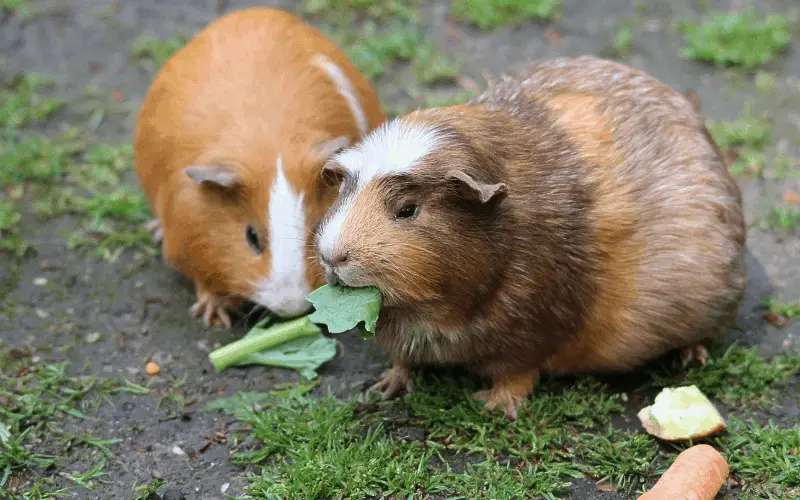Do guinea pigs stop eating when they are full? This has been a confusing question to some of my readers who have a guinea pig as a pet – and the simple answer is yes; guinea pigs can stop eating when they are full.
Most animals eat as much as you feed them without stopping and knowing when they are full. But Guinea pigs understand when they have had enough, and they certainly feel the urge to stop when they are full.
Still, this doesn’t mean that if you feed them more than usual, they will refuse the extra food. No guinea pig will refuse food unless they are sick.
Guinea pigs can eat a lot, but they always know the right time to stop. I know this sounds a bit confusing, but I promise to make it more understandable, just read on.
Do Guinea Pigs Stop Eating When They Are Full?
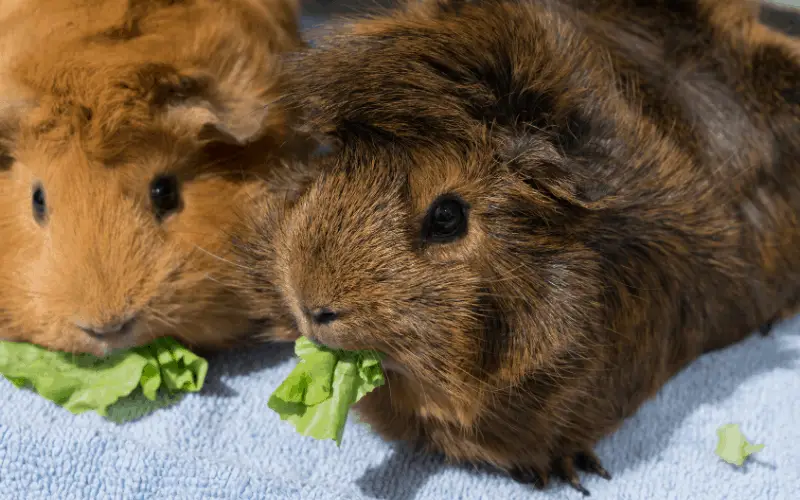
Interestingly, guinea pig stomachs are almost similar to those of humans. When a human is hungry, the stomach signals the brain.
This also happens when they are full, too, so humans know when they can stop eating. You probably didn’t expect to hear this as well, but it’s the same thing that works for guinea pigs.
When guinea pigs are hungry and crave food, their brains, of course, receive a signal from their stomach, informing them it is time to eat.
When they must have eaten and are full and satiated, once again, their stomachs signals the brain telling the brain it’s ok for now, thank you.
Read Also: How Much Food Should Guinea Pigs Eat?
When Do Guinea Pigs Eat?
This is the complicated part. They eat pretty much all the time. They seem not satisfied all the time, but I don’t think that’s the case.
The truth there is that they just love chewing and biting things, and if you love these kinds of activities, how can you not love eating?
Also, when they feel they are full and receive a signal, they will go to sleep. Their digestive system is speedy.
This is why, after consuming an ample amount of food and having a small amount of sleep, they can still eat more. It is normal; it seems strange to humans because our digestive system is not as fast as theirs.
Why Guinea Pigs Stop Eating When They Are Full
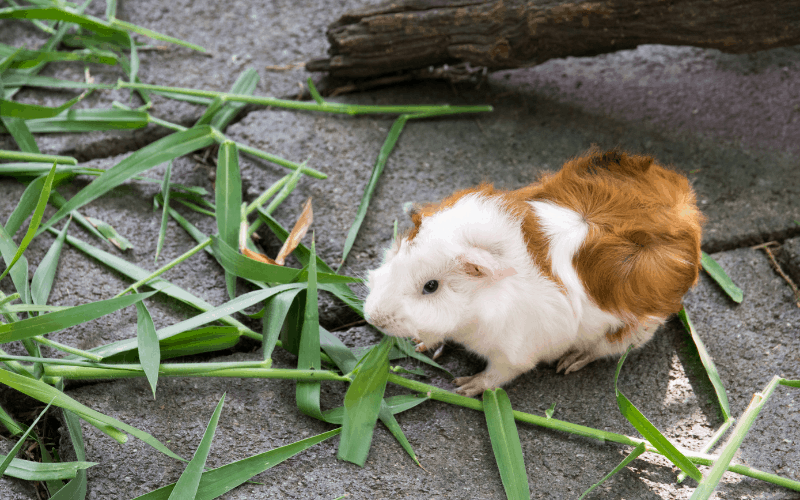
Diet
Guinea pigs will stop eating when they are full and don’t depend on their diet at all. But since we are on this topic, we can talk a little about their best systematic diet plan.
Guinea pigs are rodents and naturally herbivores: they need food that keeps their teeth and hunger under control. However, they need food that is very healthy and plant-based.
Every living animal on this planet is considered healthy if he or she has a balanced diet.
With that being said, I will tell you what foods are best for your guinea pig. I don’t like a boring list, and I feel you also don’t like that, so that I will talk to you through them.
The most basic necessity for any pet is an unlimited supply of freshwater all the time. Their bottle should be at least washed or rinse every day. Never overlook the importance of water for animals and also for humans.
The most important type of food for your guinea pig is hay. But as necessary as it sounds, you need to be on the lookout for the kind of hay you purchase (high-quality hay is free of foreign particles, green, and has a fresh smell).
Your hay has to be a high-quality one such as timothy hay. Hay produces fiber for your guinea pig, which is very vital for their health. Additionally, hay keeps guinea pigs teeth clean and fresh, without letting them grow too much.
You should feed your friend one-quarter of a cup of pellets. This is not as essential as fresh hay consumption, but they supply vitamins and nutrients that hay cannot provide, significantly if it is fortified in vitamin C.
Guinea pigs cannot produce their vitamin C just the same way humans cannot make their own, so it is administered. It is essential for them every day, and most guinea pigs get it from their usual diet, but if they don’t, you need to give them powder or a tablet of vitamin C a day. Water-soluble vitamin C drops are not recommended.
Vegetables are thought to be much more important than they are. Because vegetables contain many vitamins and nutrients, people think they can feed their guinea pigs only with vegetables.
That is very wrong. Guinea pigs are allowed to eat up to a cup of vegetables a day, and you should limit their intake of vegetables. As a pet owner, you need to be cautious about their calcium intake as it can cause bladder stones and other complications.
Lastly, they are allowed to have a little treat or a sweet snack. They can be fed a small fruit every day, it is beneficial but never do this too much, because their digestive system is very sensitive.
They are sensitive creatures
Their poo is an excellent way of seeing if they have any health problems. This is why I always recommend treating guinea pig diarrhea by visiting a vet.
Any change in their diet may cause something. Any wrong choice you make regarding their diet will show in their poo, so be careful about that and remediate the situation as quickly as you observe something wrong.
Avoid feeding your guinea pigs things like chocolate, popcorn, spicy food, iceberg lettuce, or potato. These things are harmful to them; they might even harm your guinea pig.
Also, always avoid commercial treats or sweet snacks for your guinea pigs because this kind of foodstuff contains many unnecessary sugar and chemicals. They are very expensive and, ultimately, a waste of money.
Avoid the consumption of pig salt wheels by your guinea pig by making it available for them. If he has a balanced diet, it should contain enough sodium.
Read Also: Do Guinea Pigs Like Mirror?
How to Handle the Feeding Mode of Your Guinea Pig
It is recommended for you to put the food of your guinea pig in a ceramic bowl. Your guinea pig will chew everything they can get their teeth on.
Overturning ceramic bowls are comfortable and very hard to destroy. This way, you limit their chance of getting hurt and your time of cleaning after them.
Another critical factor to note is to adjust the quantity of food you give your guinea pig. They might become underweight or overweight.
Another obvious but vital thing to be aware of is always giving your guinea pig fresh food and fresh water. First and foremost, it is healthier, but secondly, guinea pigs are picky eaters, so they won’t probably eat old food in their cage. Keep this in mind, and don’t waste food.
What Happens If Your Guinea Pig Doesn’t Eat?
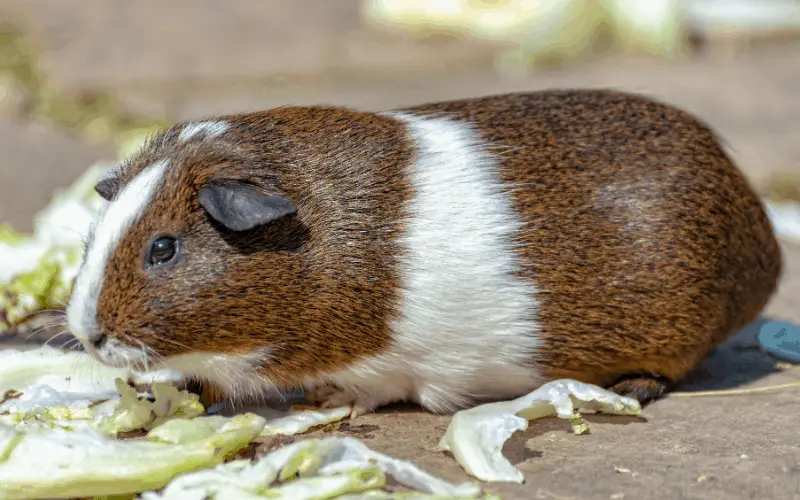
This could result from a severe health problem, and you need a doctor to get you through this. First of all, you need to understand how important this is: not eating can cause several ailments and even lead to death.
Your guinea pig’s inability to eat can be either of these two reasons: inappetence or anorexia.
1. Inappetence
This is a normal phenomenon, and it can occur anytime. This can be as a result of changes in diet or external changes.
Bear in mind: guinea pigs are very sensitive, so any change in their environment will affect them just as much as a change in their body.
This lack of appetite can be a result of a lot of diseases. Notify your doctor as quickly as possible as soon as you notice something like this.
2. Anorexia
This condition is not similar to lack of appetite; it is the same as refusing to eat. This can occur because of so many factors, such as malocclusion (misaligned teeth). Guinea pigs suffering from this disorder cannot physically eat.
You cannot solve this issue alone, so don’t have to be scared to go to a vet doctor. The vet doctors will examine and determine their diseases, possible infectious-diseases, and anything that can cause this lack of appetite.
If you are a pet owner, most especially a guinea pig owner, or if you are planning to be, it can be very overwhelming. As everybody knows, guinea pigs are significantly sensitive pets, and they need a lot of time and attention.
Many things can affect them, and there are many things you need to do as a guinea pig owner to keep them healthy and happy.
When it comes to the side of food, I can confidently say that a guinea pig owner has to spend quite a large amount of money on their food. But always be mindful of what you feed your guinea pigs and how much you provide them.
Read Also: Can Guinea Pigs Be Overfed?
Conclusion
Most pet owners don’t think giving yes as an answer to do guinea pigs stop eating when they are full is the right answer to the question, but after going through this article I believe, I have overcome your confusion.
This article highlighted so many credible reasons why guinea pigs stop eating when they are full. I believe that after going through this article, you will be comfortable with those reasons.
Small Pet Select 2nd Cutting Perfect Blend Timothy Hay Pet Food
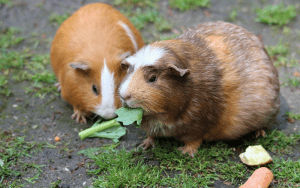
Small Pet Select 2nd Cut Timothy Hay is a perfect balance of stem, seed-head, and leaf to provide the rough fiber needed for normal wear to healthy teeth and yummy features with a fresh smell to keep them coming back for more.
Product SKU: B07CJ2FRNC
Product Brand: Small Pet Select 2nd Cutting Perfect Blend
4.4
Pros
- Good value for the price
- Smells good, great and fresh
Cons
- Inconsistent that some have poor quality hay
Oxbow Natural Science Vitamin C Supplement

Natural Science Vitamin C contains high fiber Timothy hay and the stabilized vitamin C that guinea pigs need and other animals benefit from during times of stress, illness, or recovery. Offer Natural Science supplements to support the wellness of your small pets.
Product SKU: B00E0HQA7G
Product Brand: Oxbow Natural Science Vitamin C
4.8
Pros
- Great supplement and good value
- Recommended by mostly veterinarians
Cons
- Hard pellets / difficult to eat
